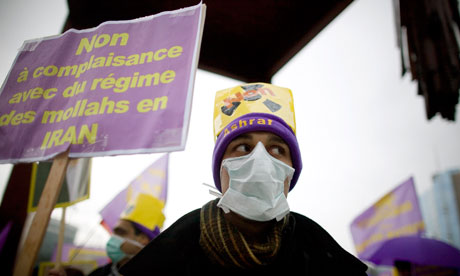By William Hague

A member of the Iranian opposition demonstrates in response to talks on nuclear proliferation. Photograph: Anja Niedringhaus/AP
On 8 June, the head of Iran's Atomic Energy Organisation, Fereydoun Abbasi Davani, announced plans to triple Iran's capacity to produce 20% enriched uranium, transferring enrichment from Natanz to the Fordo plant. Inside Iran this announcement by a discredited regime drew little comment and was quickly overshadowed by the domestic political theatre of the latest high-profile tussles between Supreme Leader Ali Khamenei and President Mahmoud Ahmadinejad. But it was an important statement because it makes even clearer the fact that Iran's programme is not designed for purely peaceful purposes.
Iran has one civilian nuclear power station and is seeking to build more. All of these power stations need uranium enriched to about 3.5% for fuel. So plans to enrich any further rightly prompt questions.
Uranium enriched to up to 20% does have some civilian uses. But not in the civilian nuclear power stations that Iran claims to desire. Predominantly it is used as fuel for research reactors, producing among other things isotopes for medical use. These are very efficient: one research reactor in Belgium is capable of producing almost all the medical isotopes needed across the whole of western Europe.
Iran has one research reactor. The plans announced by Davani would provide more than four times its annual fuel requirements. Yet this reactor is already capable of producing enough radioisotopes for up to 1m medical investigations per year – already comparable to the UK and much more than Iran needs. The plan would also require diverting at least half of Iran's current annual output of 3.5% enriched uranium, and so deny it to Iran's nuclear power stations. If Iran is serious about developing civil nuclear energy, why divert limited materials and resources away from the civil energy programme in this way, while spurning offers of technological assistance for Iran's peaceful use of nuclear energy from the outside world, including the E3+3 countries of the UK, China, France, Germany, Russia and the US?
Yet there is one clear purpose for this enriched uranium. Enrichment from natural uranium to 20% is the most time consuming and resource-intensive step in making the highly enriched uranium required for a nuclear weapon. And when enough 20% enriched uranium is accumulated at the underground facility at Qom, it would take only two or three months of additional work to convert this into weapons grade material. There would remain technical challenges to actually producing a bomb, but Iran would be a significant step closer.
Iran's intensified uranium enrichment is envisaged to take place at a previously covert site, buried deep beneath the mountains. That it claims to allow International Atomic Energy Agency monitoring is not a safeguard. Iran has a persistent record of evasion and obfuscation with the IAEA. It has failed to provide the IAEA with access to relevant locations, equipment, persons or documents. It has not replied to questions from the IAEA on its procurement of nuclear-related items and aspects of its work that could be useful only for developing a nuclear weapon – such as multipoint detonation for the initiation of hemispherical explosive charges or, in plain English, detonators for an atom bomb. It has an active ballistic missile programme, including the development of missiles with a range of over a thousand kilometres, and carried out a range of missile tests in June. A reasonable observer cannot help but join the dots.
This is not an abstract issue: Iran's nuclear programme could lead to a nuclear arms race in the Middle East, already the world's most volatile region. It would be both naive and a derogation of duty to give them – once again – the benefit of the doubt.
This is why there are already six UN security council resolutions that require Iran to suspend enrichment immediately, all ignored by Iran. Iran has so far refused to enter into any negotiations on its nuclear programme until the E3+3 agrees to lift all sanctions and immediately recognise Iran's right to enrich. But there will remain no rationale for lifting sanctions until Iran engages in negotiations to address what are well-founded concerns about its nuclear programme. So far, Iran has done the opposite.
This latest revelation demonstrates the urgency of increasing pressure. The UK is prepared to take action: I have already agreed a further 100 designations to add to EU sanctions in May, and last week announced additional travel bans against known proliferators. Iran may hope that the unprecedented changes of the Arab spring will distract the world from its nuclear programme. We are determined that it shall not.
-This commentary was published in The Guardian on 11/07/2011
- William Hague is U.K. secretary of state for foreign and commonwealth affairs
- William Hague is U.K. secretary of state for foreign and commonwealth affairs
No comments:
Post a Comment